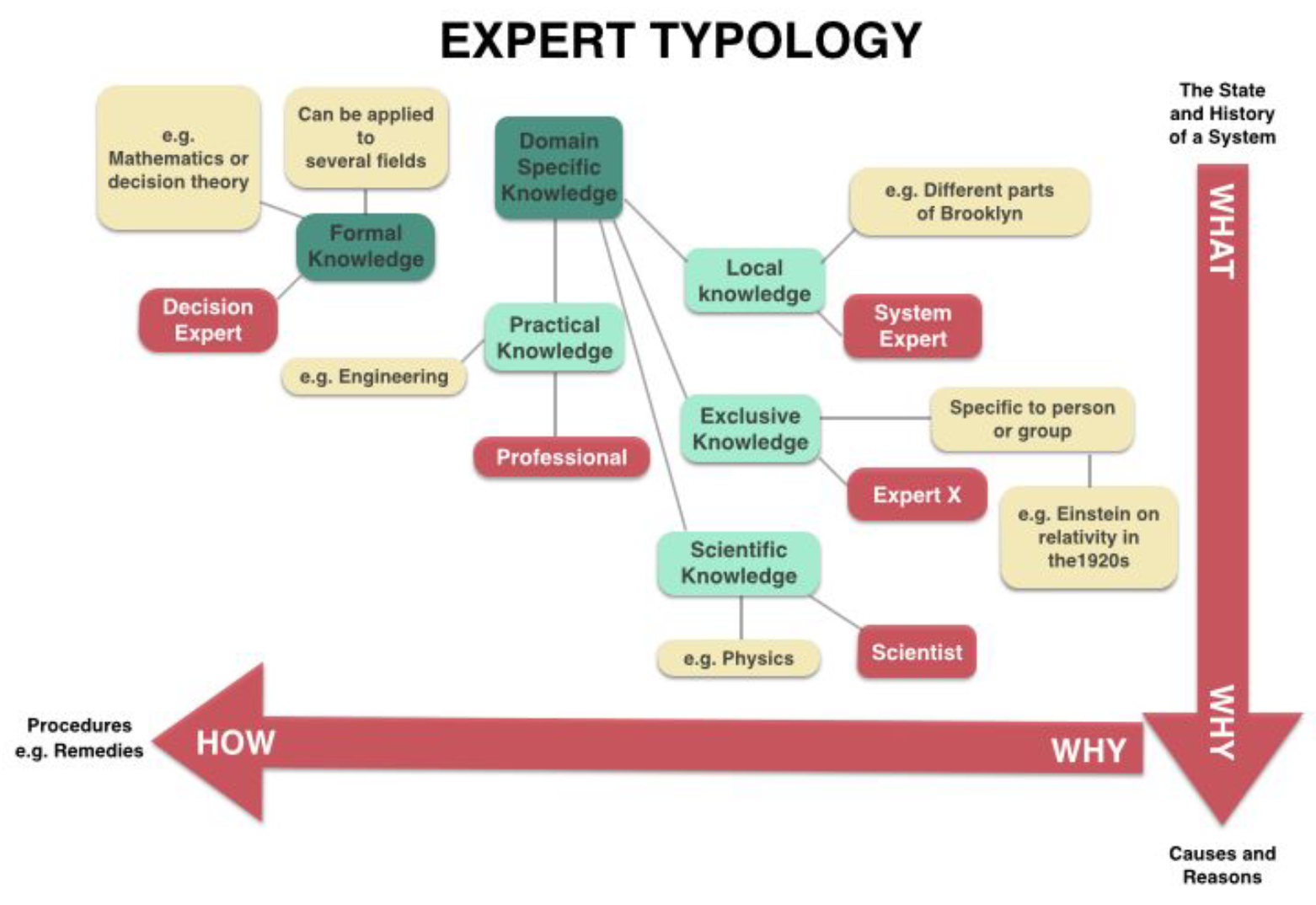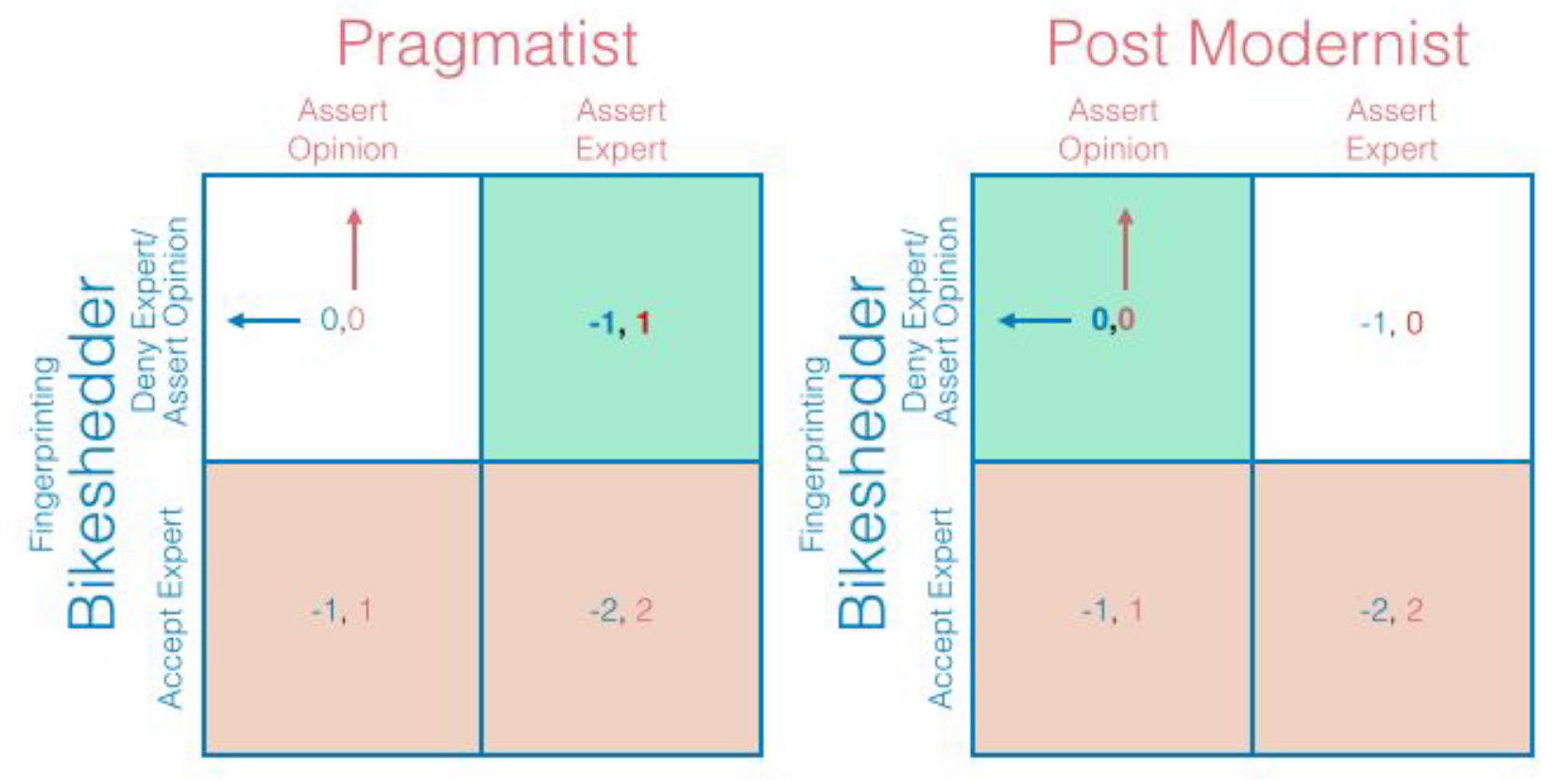Bikeshedding is a destructive way to communicate ideas.

What is a Bike Shed?
When there are multiple paths to an outcome with no one path being better than the rest, that outcome is a bike shed. The term bike shed comes from an example of a company engaging in a relatively trivial and unimportant discussion to develop a storage area for the company’s bicycles17. The specific way to develop a bike shed is not important and the series of steps used to develop a bike shed creates this unwarranted
discussion.
What is Bikeshedding?
Bikeshedding occurs when people actively engage in a discussion about a bike shed, or when people actively deny that an expert exists in order for their opinion to be valued higher. This situation seems to appear for a number of reasons ranging from unintentional misinformation to intentional actions with political motives.
Why Bike Sheds and Bikeshedding matter
If an outcome is a bike shed, the discussion of which process is used to obtain the outcome does not matter. What does matter is the time wasted arguing about the process. Many organizations waste time arguing about which process to use for outcomes that are bike sheds, wasting valuable time that could be spent better elsewhere. A true bike shed can safely be decided by a coin flip with no time spent discussing the matter.
If an outcome is not a bike shed, but is treated like one (e.g. one party acts as if there is no expert on the subject for political gain which will be covered later in the gaming section), the discussion of the process used to obtain the outcome does matter, and the value of the time spent identifying expertise increases (with diminishing returns) with the value of the outcome.
Put in another way, if an outcome is a bike shed and is treated like one (a discussion about the process happens), there is a loss of time. If an outcome is not a bike shed, but is treated like one (experts are ignored), any loss is an opportunity cost.
How do you know something is a bike shed?
Determining if a topic is a bike shed can be very difficult. An outcome is a bike shed if there is a no right way to accomplish it. This implies that there is no expert to consult on the process for bringing about the outcome. This could mean that the subject of the outcome has no domain of expertise or that there may not even be a single expert focusing on the subject. It could also mean that it is impossible to be an expert on the subject, because the topic is too elusive, too subjective, or possibly even internally incoherent. There may even be false experts on the subject (e.g. snake oil salesmen), which introduces the idea that there are sometimes incentives to create a bike shed where none exists.
What is an expert?
Determining who are the experts in an area is a harder task than it would seem. It is easier to explain what an expert does than what they are. Harald Mieg in ‘The Social Psychology of Expertise’2 says a ‘dispositional expert’ as ‘… able to explain a matter through the application of their type of knowledge’. He then goes on to say knowledge can be broken down into categories of what, why, and how as shown in the diagram below. Domain knowledge focuses on the what and why, with how being procedural knowledge. Bike sheds normally focus on the how or procedural knowledge, because it is the process or series of steps to accomplish the outcome that is in question. The worst bike sheds usually prop up around how to do a something versus why something exists or what specific attributes something has.

How do you know someone is an expert?
One way to determine experts is to poll the domain. A way to poll the domain is to review three highly reviewed books or peer reviewed articles on the subject and make note of the general consensus between the authors. A more difficult problem is the question of whether a domain of knowledge is valid or not. Depending on the type of knowledge needed, a domain’s claim can be judged by how scientific they are. When the domain lacks a scientific basis, you can at least judge it by how internally consistent it is. This would be similar to the the way you would judge Euclid’s geometry axioms3. One of the axioms in Euclid’s system could be denied, but at least the system is still internally consistent (i.e. at least it can be wrong).4 Some ideas, plans, ands reasons are not even capable of being wrong. For the purpose of bike sheds, internally inconsistent domains are prime suspects for true bike sheds, in so far as they are by definition contradictory.
Professional Advice
The pragmatic approach to determining experts is to determine if they are successful at what they do. This could be based on any metric such as success in a market i.e. whether or not the expert makes a living using expert knowledge. You still must be careful here, as it may be difficult to determine if the professional’s success is determined by their knowledge being true. An example would be getting investment advice from a financial ‘expert’ who makes a living off of giving mutual bonds sales advice rather than making successful investments. This would not be a true market test of advice.
Professional versus Amateur
Steven Pressfield in “The War of Art”5 says, “The word amateur comes from the Latin root meaning ‘to love.’ The conventional interpretation is that the amatuer pursues his calling out of love, while the pro does it for money.” It makes sense to believe that knowledge from someone that depends on that knowledge for their livelihood (a professional) would be more reliable than knowledge acquired in someone’s spare time (an amateur). That being said, the consensus of a group of professionals in that domain should hold even more weight than an individual professional. The value of the amateur’s advice is a function of the professional he or she quotes.
Why do Bike Sheds occur?
Bike sheds occur unintentionally or intentionally based on social conditions or political reasons. It is useful to be aware of how each position develops when trying to minimize the effects of the bike shed.
World Views
To people with highly subjective views of the world, e.g. post modernist views, the idea of experts may be slightly more controversial than those with different world views6, such as that of pragmatism. An important thing to note in these types of discussions is whether or not the parties involved are being consistent. Special pleading7 occurs if a party knowingly or unknowingly decides some domain knowledge is good in one case and not good in another without identifying a reason for the exception.
Bikeshedding Games
It can also be advantageous and even rational for an individual to deny experts. If we look at the bike shed as a two player game, the outcome of a negotiation where a player denies the expert can be positive if matched up with another player who also plays indifferent or denies that an expert exists for that subject. If a discussion over the color of a literal bike shed occurs and player one has a desire to fingerprint8 (that is to say player one has a desire to get credit for being actively involved with the project), he or she has incentive to lobby for the color to be a subjective matter of personal taste. Player two may want the bike shed to be resold on the market and is less interested in fingerprinting. Player two could lobby for a designer to pick the color based on what is trendy and best for resale if this option came to his or her attention. If player one actively knows that a designer would help with resale, but denies the position that any expert exists on the matter of color, he or she creates an opinion versus opinion situation and is bikeshedding intentionally. Player two for various reasons may not assert that an expert exists (perhaps he or she is a post modernist who truly believes beauty is in the eye of the beholder and therefore should not be judged), in which case asserting an expert is not even a choice. Regardless of player two’s prerogative, it is always rational for player one to deny the expert. This is intentional bikeshedding.

Application
Business books
Business books and their discussion are a prominent area for bike sheds. On the theory side, popular arguments have been put forth which call into question the most prestigious domains of business and economics. For the more pragmatic side, there are numerous conflicting10 11 12 popular books on business that all seem to have different views on priorities. When this is the case it is helpful to consider the context in which the expert is claiming knowledge. If the knowledge is based on large companies, and you are interested in small companies, that would be a variable in the expert’s thesis that needs to be controlled13 14. You would then be justified in denying that expertise. Polling can be another good way to find answers involving conflicting business literature. You may not be able to decide if a lean15 or disruptive16 business model uses the context most similar to yours, but you can have ideas accepted by the vast majority of business literature, such as making decisions based on accepted accounting principles17 or the fact that you should base your marketing budget on your sales18.
Strategy
Perhaps the one of the most difficult areas to detect bike sheds in is the area of strategy. The type of strategy we are talking about falls in the how area of the expertise chart and is also known as decision theory. Decision theory is procedural which means it outlines the steps someone takes on the way to an outcome. The difficult thing about strategy19 is the boundaries20 of any model of strategic correctness is limited to its internal consistency. This simply means that while there often times no right answers21 there certainly are wrong answers in the form of incoherent models. Strategy and decision theory help find answers in coordination and competition problems while outlining the limits of what is coherent. The problems addressed in strategy are complicated and the answers are sometimes counter intuitive. Having said this, it should be noted from a pragmatic standpoint, the most powerful decision makers in the world have teams of decision theorists22 assisting them.
Summary
Bike Shedding is a counterproductive way to communicate ideas. If the behavior is based on an intractable problem and is unintentional, the time and effort wasted can cause aggravation within the group. Intentional bikeshedding on tractable problems should be treated as a serious offense as the opportunity cost could cause significant loss.
- http://en.wikipedia.org/wiki/Parkinson%27s_law_of_triviality
- http://www.amazon.com/Social-Psychology-Expertise-Professional-Applications/dp/0805837507
- http://en.wikipedia.org/wiki/Euclidean_geometry
- http://en.wikipedia.org/wiki/Not_even_wrong
- http://www.amazon.com/War-Art-Through-Creative-Battles/dp/1936891026
- http://en.wikipedia.org/wiki/World_view
- https://en.wikipedia.org/wiki/Special_pleading
- http://bikeshed.com
- https://en.wikipedia.org/wiki/Fooled_by_Randomness
- https://en.wikipedia.org/wiki/Good_to_Great
- https://en.wikipedia.org/wiki/In_Search_of_Excellence
- https://en.wikipedia.org/wiki/Winning_(book)
- https://en.wikipedia.org/wiki/Confounding#Examples
- https://en.wikipedia.org/wiki/Omitted-variable_bias
- https://en.wikipedia.org/wiki/Kaizen
- https://en.wikipedia.org/wiki/Disruptive_innovation
- https://en.wikipedia.org/wiki/Generally_accepted_accounting_principles
- http://www.businessweek.com/smallbiz/content/feb2009/sb20090210_165498.htm
- https://en.wikipedia.org/wiki/SWOT_analysis
- https://en.wikipedia.org/wiki/Bounded_rationality
- https://en.wikipedia.org/wiki/Arrow%27s_impossibility_theorem
- https://en.wikipedia.org/wiki/RAND_Corporation
Copyright © 2016 W. Watson, Vulk LLC. All Rights Reserved
